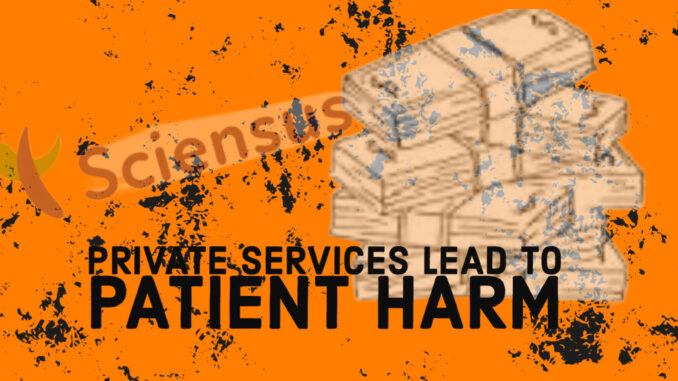
Liz Peretz is a member of Oxfordshire Keep Our NHS Public, We Own It and the Socialist Health Association.
Sciensus – a prime example of how the private sector cherry-pick health services, and why it’s imperative they are stopped
Sciensus is a giant, sprawling multi-million-pound organisation which ripped a profitable chunk out of our NHS. It started as Healthcare at Home in 1992, seizing the hospital function of delivering and administering medicines at home. Hoping to cash in on the current political passion for AI solutions in healthcare by renaming itself Sciensus, at a stroke this outfit has added a layer of complication into the system, affecting some of the most vulnerable patients in the country.
Previously, hospitals would have used their own outreach teams to continue treatment of cancer patients, or otherwise chronically sick people. In the best circumstances, these outreach teams would be in close contact with the patient’s GP surgery and district nurse, using medicines from the hospital pharmacy – the whole system approach at its best.
But once NHS England promoted HealthCare at Home via the national NHS Framework, hard-pressed NHS Trusts were seduced or cajoled into making their own contracts with the company.
Sciensus is now a multi million pound company
‘Sciensus, previously known as Healthcare at Home, is a provider of out-of-hospital healthcare, this can be at home, at work, or in the community. It operates through working with three kinds of provider: public, pharmaceutical companies, and private companies. It employs 1700 staff throughout the UK, including more than 500 clinicians across the UK. The company supports in excess of 200,000 patients every year across 49 therapy areas and 450 chemotherapy regimes…
‘According to the latest filed accounts at Companies House, Healthcare at Home reported revenue for the year to 31 March 2022 of £1,508.7 million (2021 £1.901.2 million), resulting in a post-tax profit of £12.4 million (2021: £20.2 million)’ (see NHS for Sale website)
Profits before patients
Predictably, Sciensus makes large profits for the shareholders. Equally predictably, it cuts corners, makes huge mistakes, some of which get into the press, and is loathed by many of its patients. Some 83% of the hundreds who reviewed Sciensus on the NHS website rated the company one star out of five.
The complaints range from drivers not turning up because they didn’t have a satnav, to wrong medication being delivered. As the company expands still further, hoping to cash in on the political drive to AI solutions under its new name, things are getting worse. The ITV and the Guardian have run many articles, there is a live petition, and questions are asked in Parliament.
As the company expands, the allegations against it are getting more and more serious. With their children’s health at risk, parents have spoken out when the company has let their children down, leaving them without their medicines. (Guardian, May 2023) Tragically, an adult patient died last month and three more are critically ill as a result of received unlicensed versions of cabazitaxel, a licensed chemotherapy used to treat prostate cancer which Sciensus was authorised by the Medicines and Healthcare products Regulatory Agency (MHRA) to manufacture. Cabazitaxel is a licensed chemotherapy used to treat prostate cancer. Following an IT mistake, the four patients were given an ‘incorrect strength’ dose of the drug. The MHRA has ‘partly suspended the manufacturing license of Sciensus’ as a result. (Guardian July 2023
But Sciensus’ day to day work continues, their contracts still intact, with a CQC rating of ‘good’. And unless we can persuade the next government to change direction on privatisation, this situation will continue. Sciensus, like so many private health care firms, appears as a standalone company, while it is actually 75% owned by Vitruvius:
‘Sciensus is a subsidiary of Halcyon Topco. Over 75% of Halcyon’s shares, however, are owned by Vitruvian Partners Llp, a European private equity firm.’ NHS for Sale
Vitruvian is a multi-billion-pound giant with its fingers in many pies – including travel, holidays, other healthcare brands such as Oxford Biomedica, ‘EasyPark’… the list goes on. With this money behind it, Sciensus can fight lawsuits with the NHS and win – however many contracts are riddled with complaints, and however many lives are compromised.
Since June, the House of Lords public services committee is staging a formal inquiry into the provision of homecare medicines services by private health companies.
What can be done?
If you have any experience of the service, please share it confidentially via the Guardian which is collating this information. Please keep the complaints rolling in. Write to your MP to get them to ask a parliamentary question. Do find out about the service in your locality, and press your local Healthwatch for any information about failings.
And… join your local Keep Our NHS Public campaign group.
Liz Peretz

More wheels within wheels, companies hidden within other companies with identities and responsibilities hidden and confused. If something goes wrong they can close up shop and move things across the organisation so they keep going on the same old way. In the end serious repercussions will be sorted by the NHS.
I thought I knew a fair bit about the impact of privatisation on our NHS but I’ve never heard of Sciensus and it’s parent companies.unfortunately i think most members of the public dont realise whats going on. I wonder if even their patients know they’re being treated (badly) by a private company as they’re using an NHS sounding name. Thanks for publicising. I’ll share.